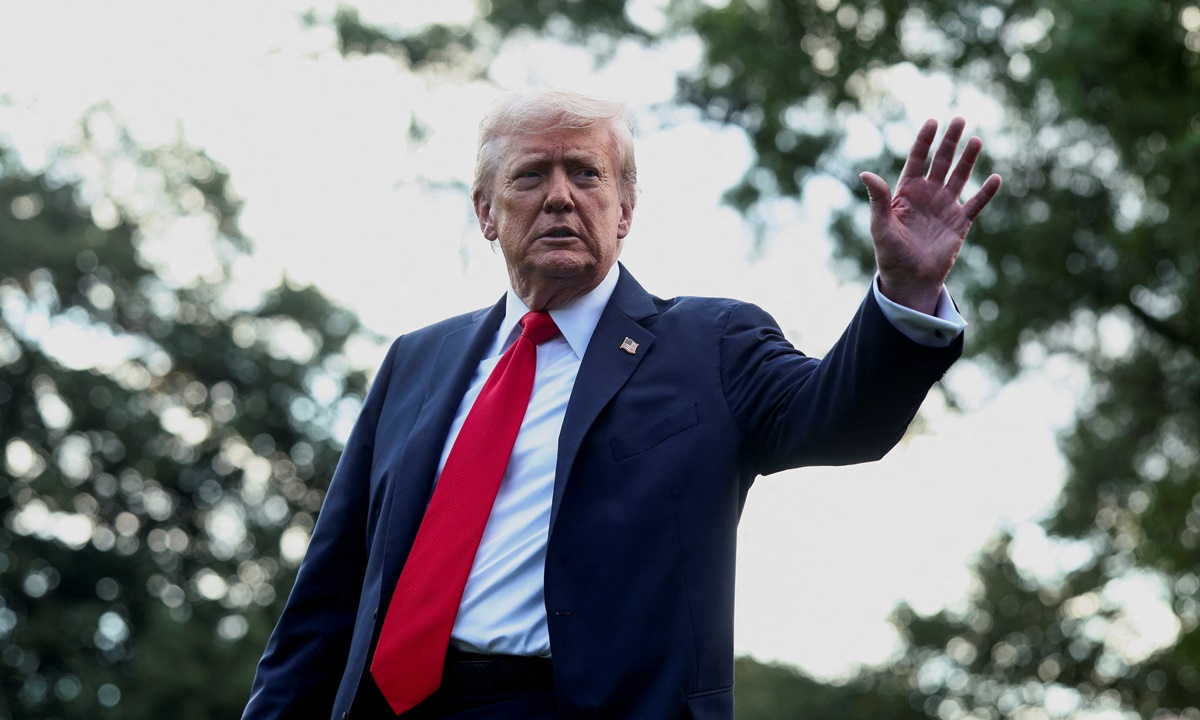In January, President Donald Trump returned to the White House promising "the largest deportation program in history" and a "golden age" for American businesses.
However, the difficulty of achieving both goals simultaneously has become increasingly apparent in recent weeks. This has led Trump to reverse or soften some of his most significant anti-immigration policies as they threaten to strain the economy.
 |
US President Donald Trump in Washington on 11/9. Photo: Reuters
President Trump has often touted his success in reducing illegal border crossings and tightening immigration controls. He now faces the reality that these strict policies clash with his efforts to boost the economy, particularly concerning foreign workers, student visas, and industries reliant on immigrant labor.
Last week, Immigration and Customs Enforcement (ICE), the spearhead of Trump's immigration crackdown, launched a surprise raid on the construction site of an LG and Hyundai electric vehicle battery plant in Georgia. They arrested almost 500 workers, mostly South Korean citizens, handcuffing and shackling them before transporting them in prison vans.
Considered ICE's largest immigration raid in months, it demonstrated their commitment to a hardline approach against undocumented workers. However, it also sparked outrage in South Korea, a key US ally and trading partner, and risked undermining foreign investment in the manufacturing sector that Trump is trying to bolster.
While ICE declared the workers were in the US illegally, President Trump suspended deportations to consider allowing the South Korean workers to remain to complete the plant, according to officials in Seoul.
However, the South Korean government was furious and sent planes to repatriate most of the workers. Seoul also announced an investigation into ICE's raid to determine whether any human rights violations occurred.
The strong reaction from South Korea, coupled with fears among foreign investors in the US, seemed to give Trump pause. On 14/9, he stated he did not "want to scare investors away from the United States, or discourage them in any way."
"We welcome investors and their employees, and are proud to say that we will learn from them and even better them at their own game at some point in the not-so-distant future," Trump posted on Truth Social.
Trump's shift has not only angered far-right allies but also confused ICE agents enforcing his deportation policies. "He's not going for the nativist purge that the rest of the administration is," said David J. Bier, director of immigration studies at the Cato Institute. "The president is always somebody who likes to experiment, but at the same time, he's always had a soft spot for economic demands from a business perspective."
White House spokesperson Abigail Jackson, meanwhile, said President Trump is "extremely consistent on immigration," adding that any suggestion otherwise demonstrates a "fundamental misunderstanding of his agenda."
In reality, however, Trump seems to have abandoned his tough stance on student visas as well, recognizing their impact on universities' financial health. International students, particularly from China, often pay higher tuition than domestic students, providing a significant revenue stream for US universities.
In May, Senator Marco Rubio announced the administration would "aggressively revoke" Chinese student visas and give "increased scrutiny" to future visa applications from China.
Less than two months later, Trump shocked conservative allies by announcing he would allow 600,000 Chinese students into US universities. "I like students from other countries coming here," he said. "And you know what happens without them? Our college system will go down very fast."
Representative Marjorie Taylor Greene, a hardliner on immigration, immediately responded by asking why the administration would allow "600,000 students from China to take the spots of our American students?" "We shouldn’t allow that," she posted on X.
Fox News host Laura Ingraham questioned Commerce Secretary Howard Lutnick on whether allowing 600,000 Chinese students in was "putting America first." Lutnick replied that it was based on the president's "economic perspective."
In June, Trump acknowledged his immigration agenda was hurting some economic sectors, including agriculture. "Our great farmers & those in the Hospitality & Entertainment business say that our very strong immigration policy is taking away good, long-time workers, who are hard to replace," he posted on social media.
The same day, ICE issued guidance instructing agents to avoid workplace raids in certain industries, including hotels and restaurants. Days later, however, ICE retracted the guidance, stating all operations would continue.
South Korean workers are chained and escorted onto a bus after US officials raided a Hyundai and LG battery plant in Georgia on 4/9. Video: ICE
Mark Krikorian, executive director of the Center for Immigration Studies, a group that favors immigration restrictions, said business interests have influenced Republican administrations for decades. Despite Trump's shifting views, Krikorian believes business interests will not undermine the administration's deportation agenda.
Trump's allies acknowledge his sensitivity to business leaders, who are increasingly worried about the consequences of his immigration policies on their operations. "The president’s a businessman. He’s going to be concerned when people say, 'You know, I can’t do business anymore,'” said Kenneth Cuccinelli, former acting deputy secretary of Homeland Security in the Trump administration.
Vu Hoang (According to AP, AFP, Reuters)












